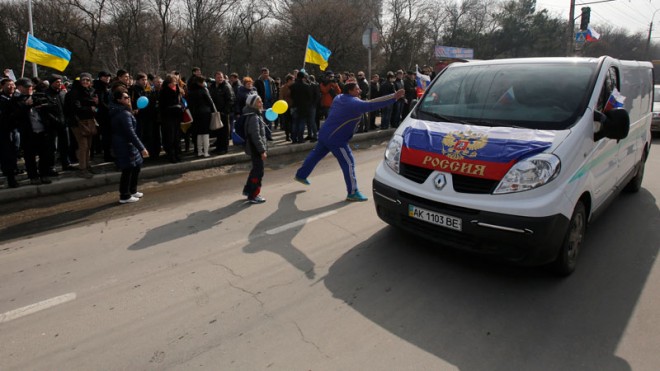Clashes in Ukraine as rival rallies raise tensions

A car with a Russian national flag drives past people demonstrating against Crimea seceding from Ukraine in Simferopol, Crimea, Ukraine, Thursday, March 9, 2014. Pro-Russian activists attacked a pro-Kiev rally in Crimea with clubs and whips on Sunday as thousands took to the streets across Ukraine in rival demonstrations, escalating separatist tensions in the troubled ex-Soviet state. AP PHOTO/DARKO VOJINOVIC
KIEV, Ukraine—Pro-Russian activists attacked a pro-Kiev rally in Crimea with clubs and whips on Sunday as thousands took to the streets across Ukraine in rival demonstrations, escalating separatist tensions in the troubled ex-Soviet state.
Interim Prime Minister Arseniy Yatsenyuk vowed Ukraine would not cede “an inch” of its territory to Moscow after Russian forces and pro-Kremlin gunmen took over the Black Sea peninsula.
“This is our land,” Yatsenyuk told a crowd of several thousand in the capital that was also attended by Russian former oligarch Mikhail Khodorkovsky, who spent a decade in prison in Russia and is a top critic of President Vladimir Putin.
The standoff in Crimea has set Europe and the United States against Russia over Ukraine’s future in the worst East-West confrontation since the Cold War.
Illustrating the divisions in Ukraine, interim president Oleksandr Turchynov led a minute of silence at the Kiev rally for demonstrators killed in three months of protests that led to the ouster of pro-Kremlin president Viktor Yanukovych.
Article continues after this advertisementIn contrast, in the eastern city of Donetsk pro-Moscow activists paid tribute to a feared riot police unit accused of shooting at protesters in clashes in Kiev that left around 100 dead late last month.
Article continues after this advertisement“Russia! Russia!” the activists waving Russian flags shouted in Donetsk, the heartland of the former president, who fled to Russia after his overthrow.
‘Illegal occupation’
In the Crimean capital Simferopol, hundreds of protesters took part in separate rallies for Ukrainian unity and for joining Russia that passed off peacefully.
“They cannot seize Crimea, (it’s an) illegal occupation,” said Svyatoslav Regushevsky, a 46-year-old who attended the unity rally with his two-year-old son, wearing a ski jacket in the colors of the Ukrainian flag.
Around 1,000 people were at that demonstration, while some 10,000 turned out for the rival one on Lenin Square across town where a sea of Russian tricolors could be seen.
“We don’t want to be with those Ukrainian fascists anymore,” said Olga, 60, who declined to give her surname, while around her placards read “Crimea is not in Ukraine” and “With Russia, Peace in Crimea.”
Pro-Russian lawmakers in the region are planning a referendum next Sunday on becoming part of the Russian Federation, a move that has been dismissed as “illegitimate” by the new Western-backed government in Kiev.
The rallies come after a new marathon round of phone calls by US President Barack Obama seeking to defuse the standoff with Russia, with each side imposing sanctions or warning of further prohibitive measures to force the other to back down.
Foreign observers from the Organization for Security and Cooperation in Europe (OSCE) have repeatedly been blocked by gunmen from entering Crimea to get a first-hand look at the situation on the ground in what Obama has said would be a vital step in de-escalating the confrontation.
A number of security incidents in Crimea in recent days point to the situation worsening, with Ukrainian border guards reporting the arrival by land and sea of 60 Russian military lorries on the rugged peninsula with a population of two million people.
The border service on Sunday also said “Russian extremists” had attacked a Crimea radar post, in the latest move by Russian forces who have surrounded Ukrainian military bases in the region and taken at least one missile defence unit.
Russian media also reported Ukrainian troop movements from Lviv in the west of the country toward the east and southeast, although officials said this was part of “pre-planned exercises.”
Phone diplomacy
Late Saturday, Obama made a fresh round of phone calls to key European allies in the latest diplomatic attempts to resolve the crisis.
In talks with his French counterpart Francois Hollande, British Prime Minister David Cameron and Italian leader Matteo Renzi, “the leaders reiterated grave concern over Russia’s clear violation of international law and reaffirmed their support for Ukraine’s sovereignty and territorial integrity,” the White House said.
Hollande’s office said the two leaders had discussed “new measures” against Russia if it failed to act to defuse the crisis.
Obama also spoke to the leaders of former Soviet states Lithuania, Latvia and Estonia.
Russia’s expansive moves, its first military campaign against a neighbor since a 2008 conflict with Georgia, have left the Baltic states jittery.
As the crisis has escalated, Washington has imposed visa bans on targeted Russians and Ukrainians and warned of wider sanctions against Russia, while the EU has halted visa and other talks with Moscow.
Russian Foreign Minister Sergei Lavrov has warned that any sanctions would “inevitably have a boomerang effect.”
A Russian defence official on Saturday said Moscow may halt foreign inspections of its vast nuclear arsenal in response to “threats” from the United States and the North Atlantic Treaty Organisation (NATO).
Adding to the tensions, state-run energy giant Gazprom has warned debt-stricken Ukraine it may cut off gas supplies over an unpaid $1.89-billion bill.
Moscow continues to insist it has sent no troops to Crimea, despite parliament giving Putin the greenlight to do so, and says it is only deploying units from its Black Sea Fleet stationed there.
Ukrainian Border Guards General Mykola Kovil said there were now 30,000 Russian soldiers in Crimea — 5,000 more than the contingent allowed under a deal with Kiev on the Russian fleet.—Dario Thuburn